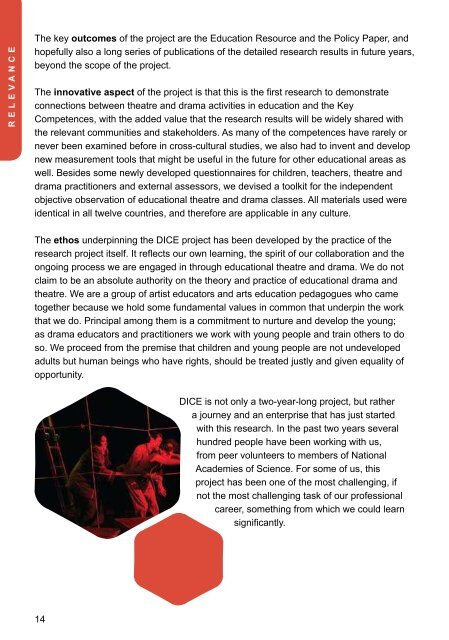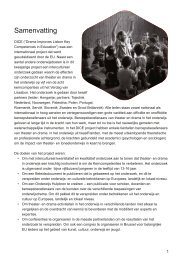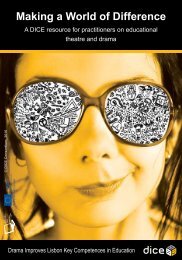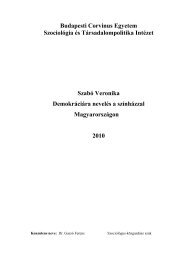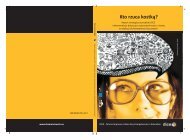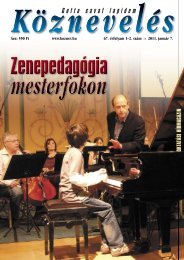Policy Paper - Drama Improves Lisbon Key Competences in Education
Policy Paper - Drama Improves Lisbon Key Competences in Education
Policy Paper - Drama Improves Lisbon Key Competences in Education
Create successful ePaper yourself
Turn your PDF publications into a flip-book with our unique Google optimized e-Paper software.
Relevance<br />
The key outcomes of the project are the <strong>Education</strong> Resource and the <strong>Policy</strong> <strong>Paper</strong>, and<br />
hopefully also a long series of publications of the detailed research results <strong>in</strong> future years,<br />
beyond the scope of the project.<br />
The <strong>in</strong>novative aspect of the project is that this is the first research to demonstrate<br />
connections between theatre and drama activities <strong>in</strong> education and the <strong>Key</strong><br />
<strong>Competences</strong>, with the added value that the research results will be widely shared with<br />
the relevant communities and stakeholders. As many of the competences have rarely or<br />
never been exam<strong>in</strong>ed before <strong>in</strong> cross-cultural studies, we also had to <strong>in</strong>vent and develop<br />
new measurement tools that might be useful <strong>in</strong> the future for other educational areas as<br />
well. Besides some newly developed questionnaires for children, teachers, theatre and<br />
drama practitioners and external assessors, we devised a toolkit for the <strong>in</strong>dependent<br />
objective observation of educational theatre and drama classes. All materials used were<br />
identical <strong>in</strong> all twelve countries, and therefore are applicable <strong>in</strong> any culture.<br />
The ethos underp<strong>in</strong>n<strong>in</strong>g the DICE project has been developed by the practice of the<br />
research project itself. It reflects our own learn<strong>in</strong>g, the spirit of our collaboration and the<br />
ongo<strong>in</strong>g process we are engaged <strong>in</strong> through educational theatre and drama. We do not<br />
claim to be an absolute authority on the theory and practice of educational drama and<br />
theatre. We are a group of artist educators and arts education pedagogues who came<br />
together because we hold some fundamental values <strong>in</strong> common that underp<strong>in</strong> the work<br />
that we do. Pr<strong>in</strong>cipal among them is a commitment to nurture and develop the young;<br />
as drama educators and practitioners we work with young people and tra<strong>in</strong> others to do<br />
so. We proceed from the premise that children and young people are not undeveloped<br />
adults but human be<strong>in</strong>gs who have rights, should be treated justly and given equality of<br />
opportunity.<br />
DICE is not only a two-year-long project, but rather<br />
a journey and an enterprise that has just started<br />
with this research. In the past two years several<br />
hundred people have been work<strong>in</strong>g with us,<br />
from peer volunteers to members of National<br />
Academies of Science. For some of us, this<br />
project has been one of the most challeng<strong>in</strong>g, if<br />
not the most challeng<strong>in</strong>g task of our professional<br />
career, someth<strong>in</strong>g from which we could learn<br />
significantly.<br />
A.2. What is <strong>Education</strong>al Theatre and <strong>Drama</strong>?<br />
The children are watch<strong>in</strong>g a refugee girl, Amani, and a boy, George, <strong>in</strong>teract <strong>in</strong> a disused<br />
railway station. Amani and George are played by two actors <strong>in</strong> role. The <strong>in</strong>teraction is<br />
fraught with tension. Amani is frightened, George is aggressive - he is frightened too.<br />
They cannot speak to each other. One of the pupils, a girl aged seven, a girl who is often<br />
quiet, distant even, taps one of the adults work<strong>in</strong>g <strong>in</strong> the programme on the shoulder. “I<br />
know what the problem is”, she says. The adult gets the attention of the actor facilitat<strong>in</strong>g<br />
the programme, <strong>in</strong>dicat<strong>in</strong>g that the child is prepared to share her understand<strong>in</strong>g with the<br />
rest of her peers. “His story is her story” she observes with quiet confidence, “and her<br />
story is his story, but they don’t realise it.” The significance was apparent to everyone <strong>in</strong><br />
the room, it was held <strong>in</strong> a portentous silence. The task for everyone <strong>in</strong>volved now was to<br />
deepen this understand<strong>in</strong>g and share it with George and Amani. This was the stuff of real<br />
drama.<br />
Suitcase – a Theatre In <strong>Education</strong> programme for children aged 6-7 years old<br />
The drama of – As if<br />
Let’s beg<strong>in</strong> with a broad def<strong>in</strong>ition of the mean<strong>in</strong>g of drama,<br />
which derives from the Greek word Dran – to do. <strong>Drama</strong><br />
is someth<strong>in</strong>g of significance that is ‘done’ or enacted.<br />
In our work it is action explored <strong>in</strong> time and space <strong>in</strong><br />
a fictional context.<br />
<strong>Drama</strong> and theatre is a shared experience among<br />
those <strong>in</strong>volved either as participant or audience<br />
where they suspend disbelief and imag<strong>in</strong>e and<br />
behave as if they were other than themselves <strong>in</strong> some<br />
other place at another time. There are many aspects to<br />
the imag<strong>in</strong>ed experience of as if.<br />
<strong>Drama</strong> is a framed activity where role-tak<strong>in</strong>g allows the participants to th<strong>in</strong>k or/and<br />
behave as if they were <strong>in</strong> a different context and to respond as if they were <strong>in</strong>volved <strong>in</strong><br />
a different set of historical, social and <strong>in</strong>terpersonal relationships. This is the source of<br />
dramatic tension. In drama we imag<strong>in</strong>e the real <strong>in</strong> order to explore the human condition.<br />
Act<strong>in</strong>g a role <strong>in</strong> a play, or tak<strong>in</strong>g a role <strong>in</strong> a drama, is a mental attitude, a way of hold<strong>in</strong>g<br />
two worlds <strong>in</strong> m<strong>in</strong>d simultaneously: the real world and the world of the dramatic fiction. The<br />
mean<strong>in</strong>g and value of the drama lies <strong>in</strong> the dialogue between these two worlds and the<br />
human subjects beh<strong>in</strong>d its representations: the real and the enacted; the spectator and the<br />
participant; the actor and the audience. Even <strong>in</strong> performance we are not simply show<strong>in</strong>g to<br />
others but also see<strong>in</strong>g ourselves, and because of this, drama is an act of ‘self’ creation.<br />
Relevance<br />
14<br />
15


